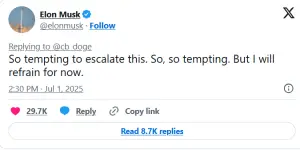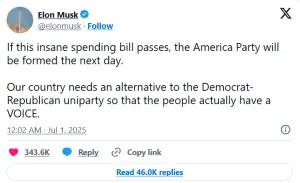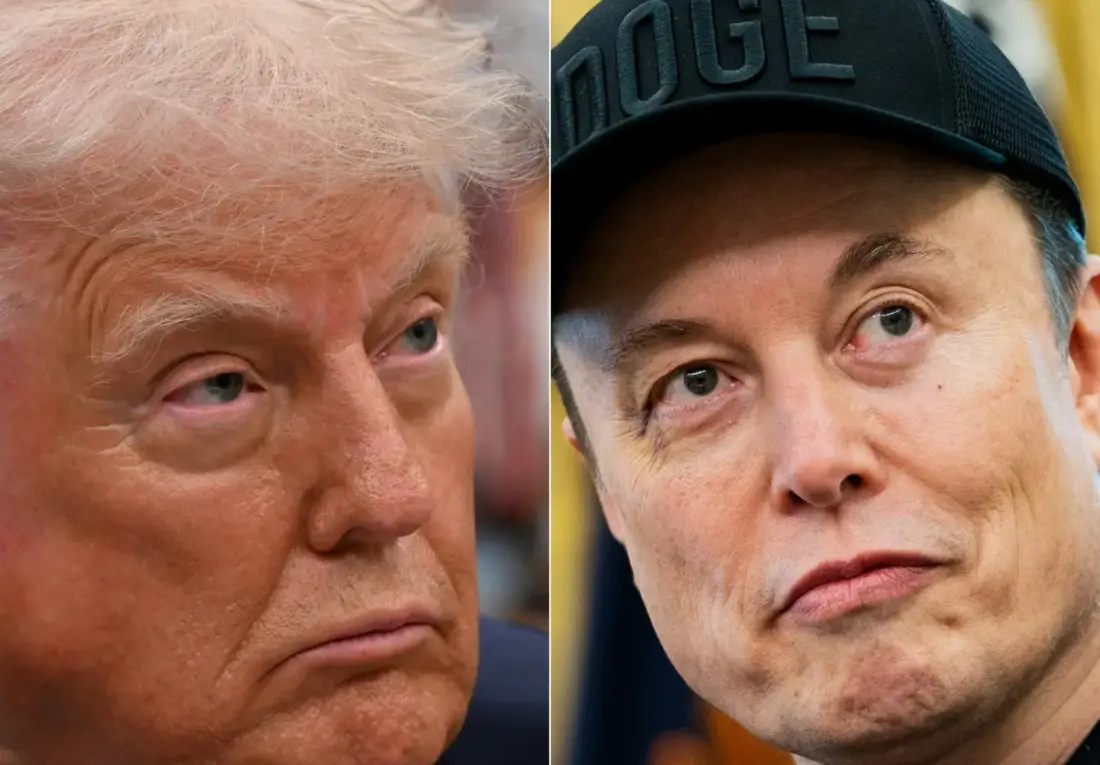It began as a political fracas—high stakes, heated rhetoric, and powerful personalities clashing on public platforms. But recently, it has taken a darker turn—into territory that skirts the edge of personal retribution and constitutional debate. In what appears as an unprecedented escalation, former President Donald Trump has now hinted at deporting Elon Musk, the South African-born billionaire and Tesla & SpaceX founder, despite Musk’s status as a naturalized American citizen. The conflict that started over policy disagreements now teeters toward personal consequences, pushing legal norms and executive power to the limits.
The Backstory: A Friendship Fractured
The tension began earlier this year, when Musk and Trump—once political allies—found themselves at odds over Trump’s sweeping legislative agenda. Trump drew Musk into government in January 2025 with an initiative dubbed the Department of Government Efficiency (DOGE), positioning Musk as a senior advisor tasked with rooting out bureaucratic waste theguardian.com+5abcnews.go.com+5theverge.com+5politico.com+8en.wikipedia.org+8en.wikipedia.org+8. But by May, Musk had left the role, citing disillusionment over Trump’s fiscal plans and policy directions.
In June, Trump introduced a massive spending and tax bill jokingly referred to as the “Big, Beautiful Bill.” Musk lambasted the legislation as “utterly insane and destructive,” citing its ballooning deficits and rollback of green energy incentives businessinsider.com+1nypost.com+1.

Trump Strikes Back: Subsidies and Deportation
Trump’s response was swift and stern. First came threats to cut all government subsidies to Tesla and SpaceX, asserting that Musk’s companies were unfairly benefiting at taxpayer expense businessinsider.com+6wsj.com+6marketwatch.com+6. Then, in late June, he upped the ante:
“We’ll have to take a look” at deporting Musk, Trump told reporters apnews.com+15politico.com+15youtube.com+15.
He also revived his DOGE reference:
“We might have to put DOGE on Elon … DOGE is the monster that might have to go back and eat Elon,” he said ndtv.com+7axios.com+7politico.com+7.
Here, “DOGE” refers to Trump’s pet-fiscal watchdog agency, a role Musk once held.
Musk’s Cautious Counter
On his account, Musk responded with a terse yet pointed tweet:
“So tempting to escalate this. So, so tempting. But I will refrain for now.” en.wikipedia.org+1en.wikipedia.org+1thedailybeast.com+3ndtv.com+3hindustantimes.com+3
Analysts read this as a calculated pause—a hint that despite it all, Musk plans to hold his fire until a more strategic moment.

Can Trump Really De-Populate Musk? The Legal Maze
At first glance, deporting a naturalized citizen seems implausible:
-
Musk obtained U.S. citizenship in 2002, via naturalization .
-
Under U.S. law, citizens cannot be deported—only non-citizens can be removed unless their citizenship is revoked.
Yet Trump’s remarks introduce the specter of possible citizenship revocation, which would involve proving fraud or misrepresentation during Musk’s naturalization. It’s a constitutional and legal minefield:
-
Investigative Mechanisms – DOGE could initiate financial or administrative reviews targeting Musk’s companies, particularly subsidies and contracts marketwatch.com+3axios.com+3nypost.com+3.
-
Citizenship Review – Citizenship can be revoked if falsification during the original application is proven. No public evidence suggests such misconduct, but Trump’s statement made the possibility concrete .
Legal scholars warn that pursuing such a path would require unprecedented proof—and likely face immediate constitutional challenges.
What’s at Stake: Policy, Power, and Public Opinion
Political repercussions:
-
A high-stakes feud now looms over Tesla investors and government relations. Musk’s public defiance shook Tesla stock prices—markets dropped nearly 6% over one session businessinsider.com+6wsj.com+6theguardian.com+6marketwatch.com+1hindustantimes.com+1.
-
A broader crackdown on subsidies could shift U.S. energy policy and undermine EV adoption.
For Musk:
-
Losing citizenship would not only bar him from staying in the U.S. but dramatically impact Tesla, SpaceX, Neuralink, and X—most of which rely heavily on U.S. infrastructure and contracts (e.g., NASA and Department of Defense).
For Trump:
-
The threat plays to his base, signaling a hardline approach against dissent—but it also risks alienating centrists and raising legal alarms.
DOGE: Watchdog or Weapon?
DOGE was initially pitched as a time-limited government watchdog. Annual savings from executive branch cuts had reached $160 billion by April 2025 en.wikipedia.org+1en.wikipedia.org+1. But its newfound role in targeting Musk raises new questions:
-
Independence vs. Influence: Is DOGE truly independent, or a partisan instrument?
-
Precedent: Using a government agency to investigate a political opponent may breach norms.
A Surprising Peace Offering?
Despite threats, Musk hasn’t entirely abandoned diplomacy:
-
He praised Trump’s recent foreign policy push—particularly the 60-day Gaza ceasefire agreement en.wikipedia.org+6axios.com+6en.wikipedia.org+6en.wikipedia.orgnews.com.au+4thedailybeast.com+4theguardian.com+4.
-
He tempered harsh rhetoric with public restraint, stating he would hold back—for now.
Analysts see this back-and-forth as tactical: Musk knows that prolonged war of words reduces political capital and could hurt his business ventures.
What Lies Ahead?
Legal pathways:
-
If Trump proceeds with investigating Musk’s citizenship, courts will likely step in—tests of power between administration and judiciary loom.
-
Restricting subsidies could motivate Tesla to find foreign revenue or relocate more operations overseas.
Political ripple effects:
-
Musk threatens to form a rival political party—timeline tied to the fate of the “Big, Beautiful Bill” theguardian.com+14businessinsider.com+14thesun.co.uk+14.
-
Public response may pivot on perceptions of overreach versus legitimate presidential authority.
Global dimension:
-
Musk’s Canadian citizenship (and connections to South Africa and possibly Russia) adds complexity if he’s forced to leave the United States .
Broader Context: Power, Public Interest, Precedent
This clash raises fundamental questions:
-
Should a president wield the power to revoke citizenship for public dissent?
-
Does subsidy withdrawal set a dangerous precedent against freedom of expression?
-
Are agencies like DOGE structurally insulated from political targeting?
Experts warn that using government authority to punish critics risks chilling public debate—and could undermine American democratic norms.
Possible Scenarios & Outcomes
1. De-escalation
-
Musk continues to walk a line—speaking out but avoiding legal escalation.
-
Trump shifts focus toward governing strategies, diffusing tension.
2. Legal showdown
-
DOGE formally investigates Musk’s American patent disclosures or subsidy use.
-
Courts step in, restricting executive overreach. Supreme Court could eventually weigh in.
3. Policy pivot
-
Trump presses Congress to defund EV tax credits or modify government contracts.
-
Tesla may push back through legal channels or diversify globally.
4. Political realignment
-
Musk forms a third-party effort—the “America Party”—that draws conservatives disillusioned with Trump businessinsider.com+8wsj.com+8en.wikipedia.org+8businessinsider.comapnews.com+1wsj.com+1.
-
Such a party could transform GOP dynamics, especially if backed by future-oriented voters.
Key Quotes, Perspectives
-
Trump:
“We might have to put DOGE on Elon… We’ll have to take a look” at deporting him nypost.com+7politico.com+7abcnews.go.com+7.
-
Musk:
“So tempting to escalate this. So, so tempting. But I will refrain for now.” thedailybeast.com+3ndtv.com+3hindustantimes.com+3.
-
DOGE on efficiency:
“Saved $160 billion in federal budget cuts by April 2025” axios.com+4abcnews.go.com+4en.wikipedia.org+4en.wikipedia.org+1en.wikipedia.org+1.
-
Analysts:
“Using DOGE against Musk… tests institutional limits of political authority” (quoted via WSJ) thesun.co.uk+4wsj.com+4theverge.com+4.
Conclusion: Beyond the Headlines
At first glance, Trump vs. Musk looks like a personal spat over policy and power. But beneath the tweets and threats lies a more profound test—one of constitutional boundaries, the independence of government agencies, and the resilience of democratic norms when powerful individuals clash.
Can America tolerate a president threatening deportation of a citizen for political dissent? Will a billionaire tech mogul’s criticisms be seen as protected speech—or punishable offense? Will a nascent third-party movement reshape U.S. politics?
In the coming weeks and months, legal filings will emerge, courts will weigh constitutionality, and the public will watch closely. Whatever happens, this moment—Trump’s threat, Musk’s restraint, DOGE’s implied menace—is forcing the country to confront questions about the limits of power in the digital age.

